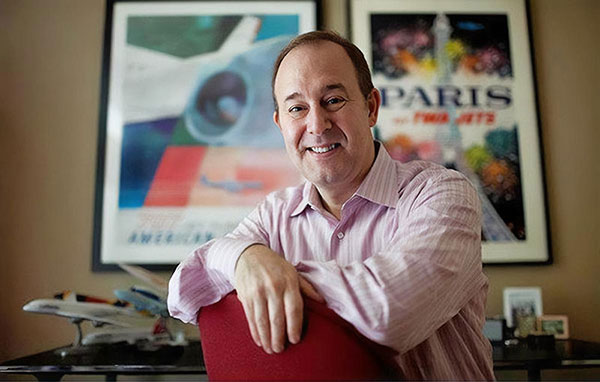
Henry Harteveldt takes leisure very seriously.
In a career spanning 40 years, Harteveldt (BSM ’81), founder and president of San Francisco-based Atmosphere Research Group, has become one of the travel industry’s leading experts, delivering market insights to clients around the world and providing industry analysis to print and broadcast media.
In that time, Harteveldt has logged more than six million air miles, launched countless ad campaigns, shaped corporate identities, and helped design passenger cabins, airport lounges and hotel rooms. He has worked for four airlines, including one he helped launch.
“I never set out to become an industry analyst, and I never set out to become a market researcher,” Harteveldt says. “But I’m by nature very curious, and this is something that Tulane encouraged. It certainly has been a very interesting career.”
Fascinated by aviation since childhood, Harteveldt learned to fly a plane before he could drive a car. His interest in travel really took flight at the Freeman School, where, as an undergraduate marketing major he got his first experience as an airline industry analyst. For a marketing class project, he and several classmates surveyed travelers at New Orleans International Airport, uncovering a preference for low prices, nonstop flights, and convenient connections. The students presented their findings to a panel of airline professionals, including Braniff International’s vice president of marketing, but the executive dismissed their recommendations. Years later, after Braniff shut down, Harteveldt ran into the executive, who remembered him and belatedly acknowledged the validity of their insights.
After graduating from Tulane, Harteveldt began his career at a Dallas advertising agency, where one of his clients was American Airlines. Two years later, he joined TWA as global marketing manager and spent the next 16 years in senior marketing roles with airlines, hotels and marketing firms. In 2000, Harteveldt became head of global travel industry research with Forrester Research just as the Internet was ushering in a new era.
“I’m lucky to have been at the forefront of how the travel industry has evolved into a digital business,” Harteveldt says. “It’s a very, very different industry than the one that I first entered four decades ago. Gone are the days of steak dinners in coach and leg room and amenities like that. But at the same time, we now have Wi-Fi on almost every airplane.”
Harteveldt has also become a frequent commentator on travel-related topics for major media outlets, including The New York Times, The Wall Street Journal and The Times of London, and he appears regularly on CBS, CNBC, Bloomberg and CNN.
“A benefit of having worked in the industry and having been an industry analyst for nearly 25 years is that you understand how it works,” he explains. “In December of 2022, when terrible weather was sweeping across the U.S. and Southwest Airlines was experiencing a massive operational disruption, I put a night in Paris on hold because I had a professional obligation to speak with these reporters and provide my perspective on what was going on.”
In his career, Harteveldt has seen both highs and lows. He served as an industry analyst during 9/11, the Great Recession, and the wave of mergers that left the industry with four dominant carriers: Delta, American, United and Southwest. But without a doubt, Harteveldt says the pandemic was the biggest disruption he witnessed.
“COVID shut down travel around the world,” he says.
In the midst of the pandemic, Harteveldt didn’t pinpoint exactly when he expected worldwide travel to resume, but he advised airlines to be prepared for a strong comeback. True to his prediction, travel rebounded fiercely in an explosion of what he describes as “revenge travel.”
“It was like this on-off switch,” he says. “One day you’re not traveling, and the next day, everybody and their brother was traveling.”
One outcome of COVID-19 has been the rise of blended business-leisure travel. While not a new concept, Harteveldt says the widespread adoption of remote work has made this hybrid tourism more prevalent, accounting for at least 20% of current travel.
Today, looking back on his career, Harteveldt credits the well-rounded education he received at Tulane for his longevity and success. He cherishes the time he spent at Tulane, where he received a foundation in both liberal arts and business, and he’s excited that the Freeman School now offers an undergraduate certificate in hospitality, providing a clear pathway for students who might want to follow in his footsteps.
“Some people dismiss travel and tourism as frivolous, yet it is an $11 trillion industry and accounts for roughly one out of every eight jobs worldwide,” Harteveldt says. “In some countries, it is, if not the largest, then the second largest source of GDP. So travel is big business. Travel is complex. It can be amazingly rewarding and fulfilling. It is, in a way, a noble calling to work in travel, especially in the airline industry. And it can be a lot of fun.”

